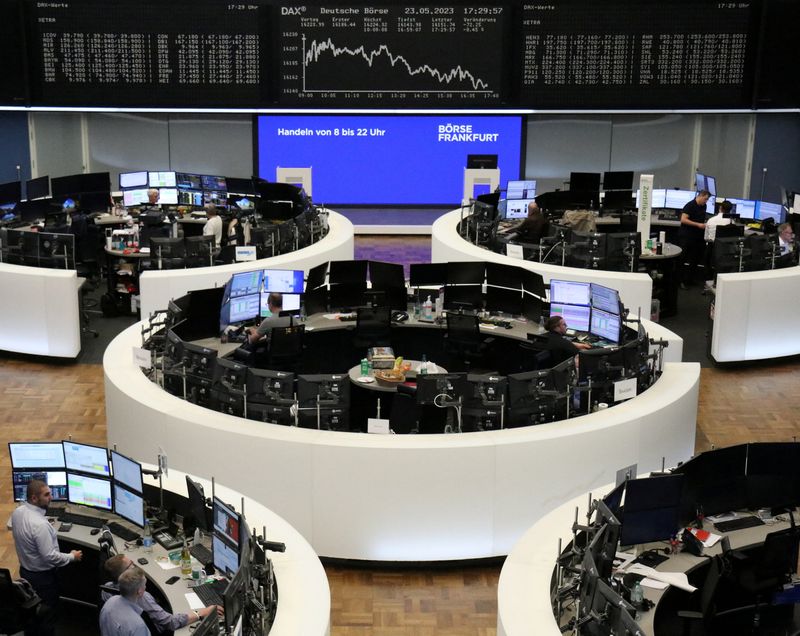By Sruthi Shankar and Ankika Biswas
(Reuters) -A fresh wave of selling saw European stocks notch their steepest one-day fall in two months on Wednesday as little progress in the U.S. debt ceiling negotiations, a jump in UK core inflation and more losses in heavyweight luxury names hit risk sentiment.
The Europe-wide STOXX 600 index slid 1.8%, its worst one-day showing since mid March, with all regional markets in the red.
"The modest declines of the last two days have accelerated as sentiment continues to deteriorate, raising the question as to whether this is the beginning of a market puke that gets US lawmakers' attention and generates the urgency required to preserve the fiscal integrity of the US government," said Michael Hewson, chief market analyst at CMC Markets.
Democratic and Republican negotiators on the debt ceiling will meet at the White House on Wednesday, according to Republican U.S. House of Representatives Speaker Kevin McCarthy.
Real estate stocks took the biggest hit, down 3.0%, followed by over 2% losses in travel and leisure and insurance stocks.
UK homebuilders dropped after data showed a closely watched core measure of UK price growth surged to a 31-year high in April, cementing bets of more interest rate hikes from the Bank of England.
"Inflation is still very high across the euro zone and particularly the UK at the moment, and that is negative overall for consumers and businesses," said Michael Field, equity strategist at Morningstar.
Adding to the downbeat mood, a survey showed German business morale fell further than expected in May, mainly due to a sharp decline in future expectations, another sign that Europe's largest economy is facing stubborn economic headwinds.
Europe's luxury stocks fell 1.7%, touching a seven-week low, as a selloff in the sector continued following a strong run this year that has been a key for positive returns across broader European markets.
Embracer Group AB plummeted 44.8% to the bottom of the STOXX 600 after after the Swedish gaming group said a major strategic partnership will not materialise and also trimmed its full-year adjusted EBIT forecast.

Meanwhile, Marks & Spencer jumped 12.9% after the company said its latest turnaround strategy was starting to deliver, enabling it to restore its dividend and forecast "modest" revenue growth and a profit outcome ahead of market expectations this year.
Further, Iceland's central bank raised its key policy interest rate by 1.25 percentage point to 8.75% and said underlying inflation is still increasing.